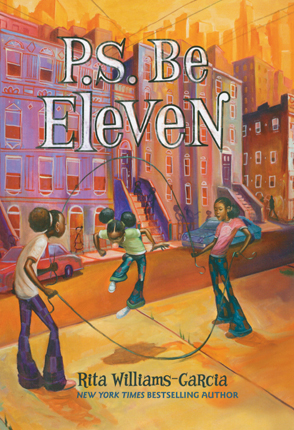Full Text Reviews: Booklist - 02/15/2013 *Starred Review* The Gaither sisters—Delphine, Vonetta, and Fern—are newly returned from a summer spent in California with their mother, Cecile, and the Black Panthers (One Crazy Summer, 2010). But life in Bed-Stuy, Brooklyn, with Big Ma and Pa is nothing like the freedom of Oakland, even if the girls carry back independent streaks. And while their summer may have been crazy, autumn is not exactly tame: Pa’s wearing cologne and whistling now that he has a girlfriend; Uncle Darnell’s back from Vietnam but sleeps a lot; and sixth grade has a new Zambian exchange teacher, Mr. Mwilla. Delphine speaks her worried mind in letters to Cecile, who always adds a postscript, reminding Delphine to “Be Eleven” and not a grown-up. (This makes for a nice recurring sentiment, if a somewhat clunky title.) Set against the tumultuous, yet vibrant, backdrop of the late 1960s—as Nixon campaigns against Humphrey and the Jackson Five are poised to play Madison Square Garden—the story is vividly narrated by Delphine, who reluctantly learns to ease control over her sisters and comes to a tough realization: “Twelve makes you know better than to wish for things that only eleven would wish hard for.” Even without the dynamic Black Panther characters, this soars as a finely drawn portrait of a family in flux and as a memorable slice of a specific time in our nation’s history. HIGH-DEMAND BACKSTORY: Williams-Garcia’s One Crazy Summer (2010) won the Newbery Honor and the Coretta Scott King Award and was a National Book Award finalist. A robust marketing campaign includes author appearances. - Copyright 2013 Booklist. School Library Journal - 06/01/2013 Gr 4–7—After their life-changing summer in Oakland with their poet-activist mother, related in One Crazy Summer (HarperCollins, 2010), sisters Delphine, Vonetta, and Fern find it difficult to readjust to life in Brooklyn. In addition to their grandmother's strict expectations, the girls must navigate the return of their uncle from Vietnam, their father's new romantic relationship, and their own uncontrollable love for the Jackson Five. Delphine finds some solace in corresponding with her mother, who reminds her not to take on too much or try to grow up too fast; instead she should remember to be 11. But each adult in Delphine's life has a different idea of what that means. Over the course of the book, Delphine strives to balance these conflicting perspectives and to articulate her own beliefs. From the very start of the story, her well-realized voice pulls readers into her rapidly changing world. Williams-Garcia ably integrates historical information with Delphine's story. Even secondary characters are complex and her nuanced understanding of the 1960s brings the setting to life. P.S. Be Eleven is a must-read for fans of the first book, but it can also stand alone as an engrossing novel that will leave readers pondering important issues of race, gender, and identity.—Gesse Stark-Smith, Multnomah County Library, Portland, OR - Copyright 2013 Publishers Weekly, Library Journal and/or School Library Journal used with permission. Bulletin for the Center... - 09/01/2013 After coming back from a summer in Oakland with her Black Panther mother (in One Crazy Summer, BCCB 2/10), eleven-year-old Delphine is glad to be home, but she soon finds that she’s not the only one who changed over the past months. Her beloved father has found himself a serious lady friend, Miss Marva Hendrix, while Mr. Mwila, an exchange teacher from Zambia, is challenging Delphine’s sixth-grade class with old-school rigor and high expectations. As Delphine negotiates these challenges over the school year, she corresponds with her mother, who sends flinty, poetic guidance to her daughter, with the befuddling encouragement to “be eleven.” Delphine’s narration again creates a captivating portrait of both the age and her age, where she and her sisters go crazy for the Jackson Five, her beloved uncle returns from Vietnam with a drug problem, and her abiding concern is the class’ spring dance; her voice is smart-preteen authentic in its blend of shallowness and thoughtfulness. Characterization is strong throughout, with Delphine’s father’s girlfriend (and eventual new wife) particularly interesting: her introduction to the group throws off the family dynamics, often in good ways (she dethrones Delphine from being the “responsible one” among her sisters, and challenges Delphine’s father and brother on their sexism). Overall, it’s a perceptive picture of Delphine’s continued and sometimes painful growth against a vivid period backdrop. It’s therefore a natural for sharing with family with their own memories of the era, and fans of Delphine’s first outing will delight in her return. DS - Copyright 2013 The Board of Trustees of the University of Illinois. Loading...
|



